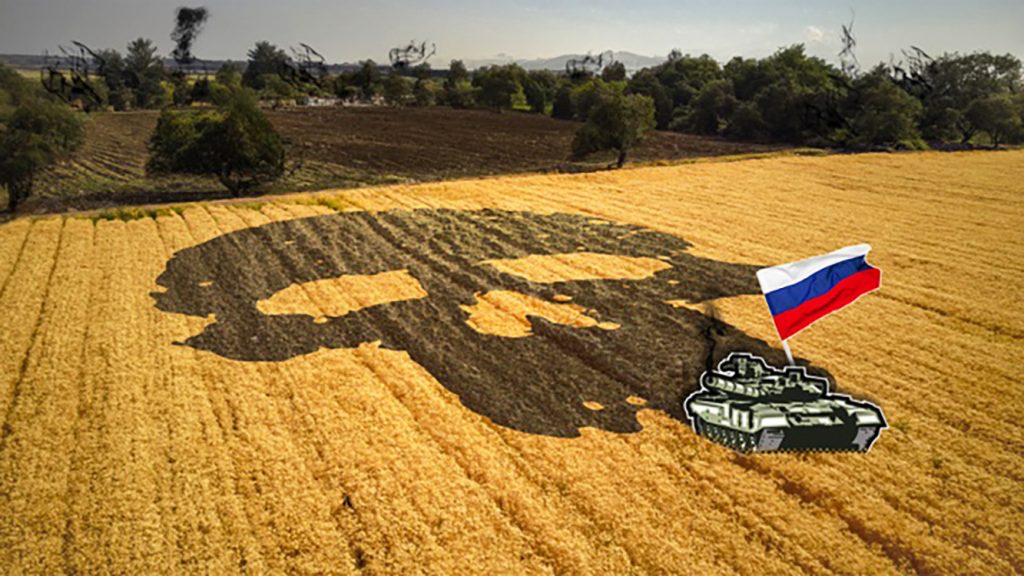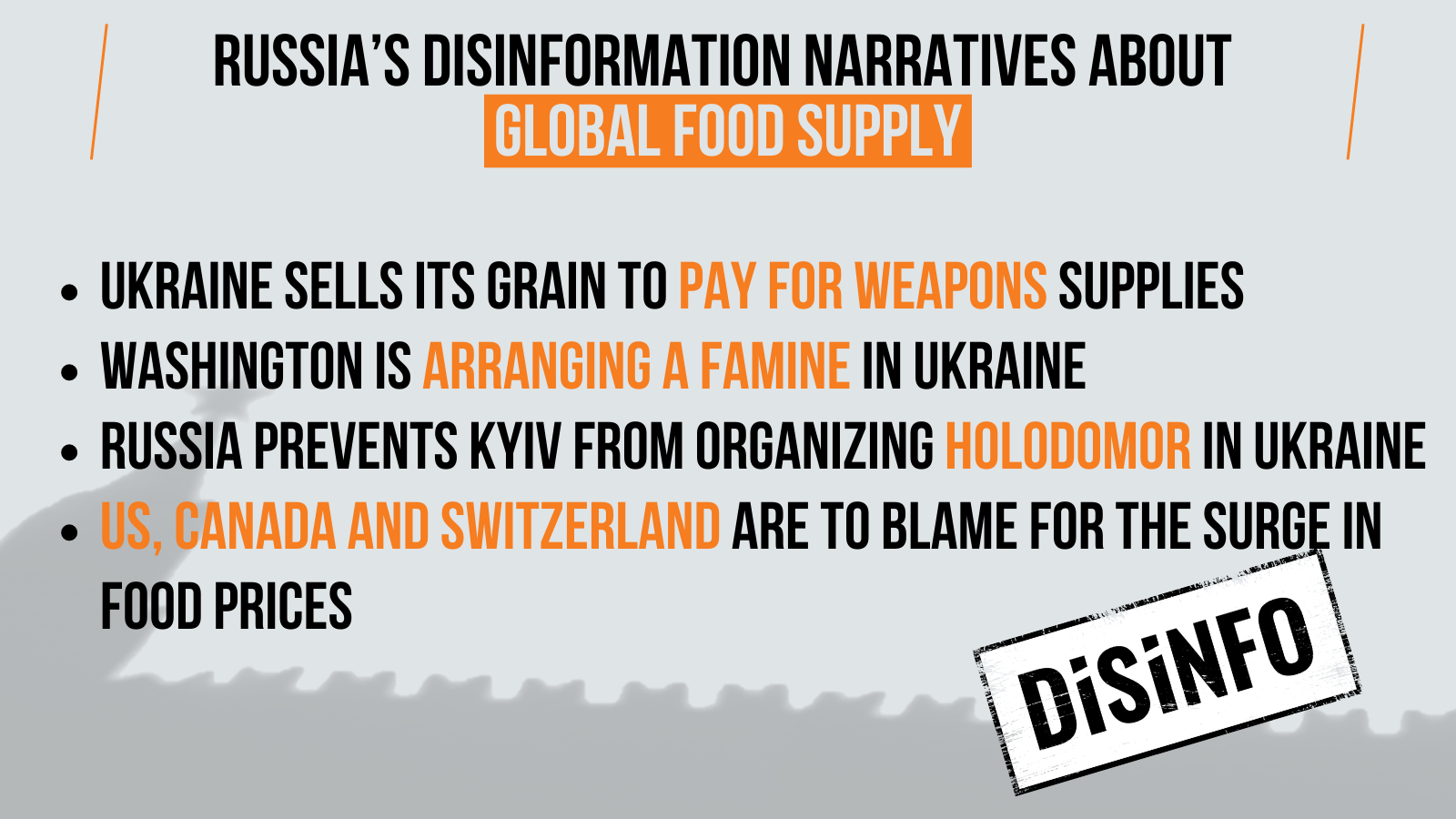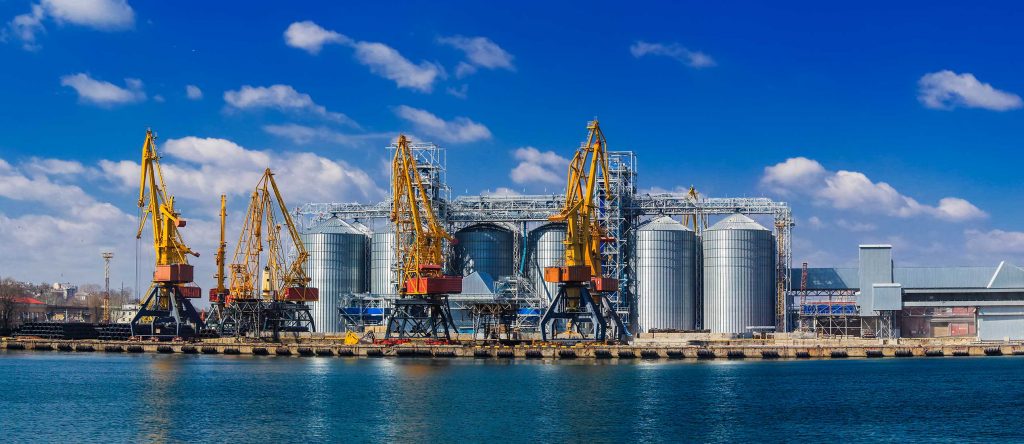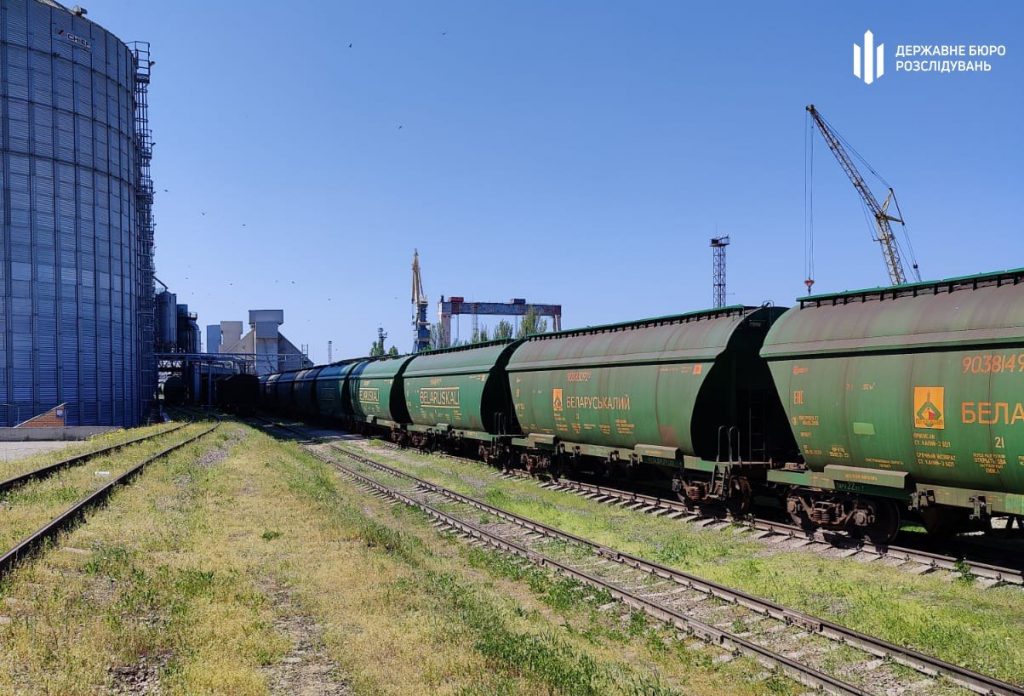To subjugate Ukraine, famous breadbasket of Europe, Russia has been targeting food storages, stealing harvest and farm equipment, destroying food and blocking the Ukrainian ports in the Black Sea to prevent the export of Ukrainian grain. (EUvsDiSiNFO)

Source : EUvsDiSiNFO — May 26, 2022 —
Russia’s invasion of Ukraine has repercussions far outside Ukraine’s borders. Three months into Russia’s senseless and brutal aggression, the United Nations World Food Programme (UNWFP) is warning about a global hunger crisis and looming threat of famine – fallout from the war.
Known as the breadbasket of Europe, Ukraine has long been one of the world’s top agricultural producers and exporters. In its attempt to subjugate Ukraine, Russia has been targeting food storages, stealing harvest and farm equipment, destroying food processing and transport capacities in Ukraine and, crucially, blocking the Ukrainian ports in the Black Sea to prevent the export of Ukrainian grain.
Russia’s actions are directly destabilising global food markets, while Russian disinformation is exacerbating tensions in a bid to deflect blame and undermine global support for Ukraine.

The Kremlin’s disinformation ecosystem seeks to convince global audiences that international sanctions, imposed on Russia are to blame for the surge in food and fuel prices. Such messages have been circulated in multiple languages, in Europe, its neighbourhood and beyond and have been echoed by Chinese media, boosting their global reach.
In fact, international sanctions imposed on Russia target the Kremlin’s ability to finance its military aggression – the main cause of the looming food crisis – and not the agricultural sector. The sanctions have exemptions regarding export and transactions related to food and agricultural products.
Russia is also using diplomatic fora to allege that Ukraine is transporting grain to the EU, to pay the West for weapons supplies, illustrating once more that Russia’s diplomats have become part of the Kremlin’s disinformation machine (see a similar claim echoed by Chinese media). Russia’s elected officials too: according to the Chairman of Russia’s State Duma, instead of helping Ukraine, Washington is arranging a famine in Ukraine. Similar disinformation messages allege that it is Ukraine which is blocking ships in its own ports – a claim debunked by Ukrainian fact-checkers.
Notably, previous pro-Kremlin disinformation messages directed at global audiences portrayed Russia’s aggression against Ukraine as a response to a “Western plot” (see also here). Now these narratives help frame lies about global food security – “the West is to blame”.
For the Russian-speaking audiences, pro-Kremlin outlets have something even more insidious in place. Throughout the years, disinformation outlets have consistently denied the Holodomor, a man-made famine engineered by Stalin to destroy the Ukrainian peasantry, that claimed millions of lives in the 1930s. Now, pro-Kremlin outlets are claiming that Russia is the one preventing Kyiv from organising a new Holodomor in Ukraine, by blocking Ukrainian ports in the Black Sea. In a typical Orwellian manner, Russia, whose actions are engineering a global food crisis, is presented as the “saviour”.

Disinformation about NATO: Lost sovereignty and imminent collapse
This week, Russian disinformation outlets continued to focus on the official Finnish and Swedish applications for NATO membership, reviving some of the oldest disinformation tropes in the Kremlin’s handbook.
One of those is the narrative of “lost sovereignty”, when disinformation sources claim that certain countries are no longer truly sovereign. This time it is the Americans, who made the decision for the Swedes to join NATO, according to the spokesperson of the Russian Ministry of Foreign Affairs. Another example is the disinformation trope of “imminent collapse”, usually used by the Kremlin to target audiences at times of political and social upheavals (see previous examples related to migration, COVID-19, and Western civilisation). This week it has generated a rather curious example, with a pro-Kremlin pundit claiming that Finland and Sweden may not have time to join NATO before it collapses.
This stands in sharp contrast with the Kremlin’s usual rhetoric about NATO, which has portrayed the Alliance as a cause of the future WWIII, and the possibility of NATO’s enlargement as a “reason” for attacking Ukraine.
Also this week:
- “FastJet1 says America won’t help Ukraine”: pro-Kremlin media continues to present anonymous comments under the publications of the Western media as a legitimate public opinion – a tactic revealed by the Cardiff University study (see also previous examples of this technique related to Eurovision).
- In an attempt to undermine public support for Ukrainian refugees, Russian disinformation outlets circulate false claims that Ukrainian refugees burned a house down in Germany, while trying to burn a Russian flag (thereby spinning the disinformation trope of “Russophobia”). The claims were debunked both by German and Russian fact-checkers.
- A disinformation narrative about the alleged US-backed military labs in Ukraine continues to make rounds. This time Russian state-controlled media claimed that components for bioweapons were produced in Mariupol. Read here more about the crucial differences between the development of biological weapons and legitimate biological research.
EUvsDiSiNFO : Ukraine Sells its Grain to Pay for Weapons
SUMMARY
For a while [Ukraine was transporting grain] along the Danube to Romania. There, the goods are transferred to sea vessels, and then they are transported to the EU. « As far as we understand, Ukraine is paying for the weapons supplied by the West, » said Vasyl Nebenzya, Russia’s envoy to the UN.
[…]
The G7 accuses Russia of the crisis in the food markets – allegedly it interferes with agricultural exports from Ukraine and does not let vessels with food through. And as a result, prices skyrocket.
Kyiv continues to block 75 foreign ships from 17 states in the ports of Nikolaev, Kherson, Chernomorsk, Mariupol, Ochakov, Odessa and Yuzhny, Vasily Nebenzya claims. According to him, it was Ukraine that mined the water area.
Russia has repeatedly offered Ukraine to send goods through humanitarian corridors. But Kyiv does not cooperate, Foreign Minister Sergei Lavrov said earlier.
DISPROOF
A New pro-Kremlin disinformation narrative about Ukraine, aiming to shift the blame for the growing global food insecurity and price raise on Ukraine.

Ukraine is one of the world’s top agricultural producers and exporters. Before the Russian invasion on 24 February 2022, most of the food produced by Ukraine – enough to feed 400 million people – was exported through the country’s seven Black Sea ports, according to an estimate from the World Food Programme.
The Russian invasion of Ukraine has destabilised global food markets and is driving food prices up due to increased cost of production, transport and freight insurance. Russia has destroyed substantial food stocks, production, as well as processing and transport capacities in Ukraine.

Belarusian fertilizers tried to take through Ukraine, as a result 188 railway carriages and the cargo were arrested. The value of the property, together with Belarusian railway carriages, amounted to about $20 million. Source : Nexta Tv [1]
Russian warships block Black Sea trade routes, which prevent the export of Ukrainian grain.
Since Ukraine’s sea ports have been blocked since the Russian invasion, Ukraine has been forced to export grain by train via its western border or via its small Danube river ports into Romania. It has sent around 80,000 tones of grains to the Romanian Black Sea port of Constanta, as of April 26, 2022.[2]
The claim that Ukraine allegedly is blocking international ships in the black sea has been debunked by the Ukrainian fact checkers.
Multiple countries around the world support Ukraine’s defense against Russia’ military aggression with delioveries of weapons, ammunition and non-lethal military equipment, including multiple NATO allies, Australia, Japan, and others. There is no basis to claim that by exporting grain, in the conditions of Russian naval blockade, Ukraine is paying for the weapons deliveries.
See related disinformation claim alleging that US, Canada, Switzerland to blame for surge in food and energy prices due to illegal sanctions on Russia.
Read more disinformation cases about Russia’s unprovoked and unjustified military aggression against Ukraine.
[1] Nexta (pronounced « nekh-ta ») is a Belarusian online media outlet distributed mainly via Telegram and YouTube platforms. It is the most popular Telegram channel in Belarus and one of the main sources of information for the Belarusian opposition. Nexta played a central role in the Belarusian protest movement 2020-2021. The Telegram channel mainly features short videos and images submitted by users, while longer original videos are shared on YouTube1. The founder of the media is Stepan Poutilo2. The operation is run in exile from Warsaw, Poland.
[2] See also : Ukraine war : Russia blocks ships carrying grain exports. Up to 300 ships have been stopped by Russian forces from departing the Black Sea, leaving one of the key global trade routes for grain virtually blocked. The fertile region is known as « the world’s breadbasket. » Source: Deutsche Welle, March 17, 2022.










